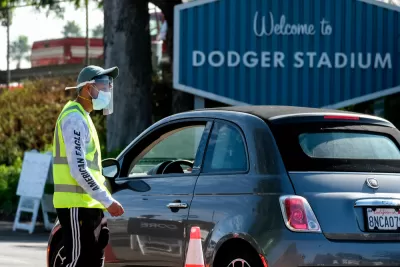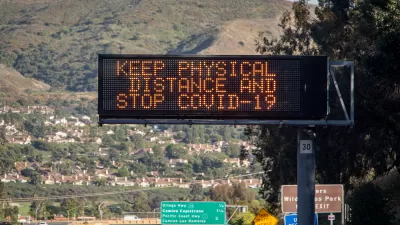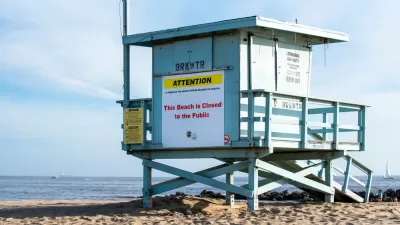Pultizer-winning science journalist and global health expert Laurie Garrett, an Angeleno, points to the Golden State's auto culture during an interview on MSNBC as one reason why the state is now the epicenter of the pandemic in the U.S.

Laurie Garrett, author of "The Coming Plague," won her Pulitzer in 1996 for her reporting for Newsday on the Ebola crisis in Zaire (now the Democratic Republic of the Congo). She was asked by The Sunday Show (MSNBC) host, Jonathan Capehart, a Washington Post columnist, to describe the state of the pandemic, particularly in California.
The Golden State leads the nation in daily new Covid cases per capita (99.3 per 100,000 people on Dec. 30, 2020, followed by Tennessee, Arizona and Rhode Island, according to The New York Times) as well as the 7-day rolling average of new reported cases (36,295 on Dec. 29, 2020).
Capehart was particularly concerned with the shortage of available intensive care unit beds. The state Department of Public Health webpage indicates "0.0% ICU availability" under "Statewide Metrics" on Dec. 29, 2020.
Garrett, also an MSNBC science contributor, first pointed to the consolidation of hospitals, particularly Southern California, as being a problem for the Golden State.
It has very large facilities, like Martin Luther King, Jr. Community Hospital, but a paucity of tertiary care facilities of smaller size spread out across the state, so you have to go a good distance to get to a hospital, and there aren't a lot of options to choose from, particularly for intensive and trauma care.
Next, she surprisingly points to personal transportation options as being a source of coronavirus transmission. While the media regularly monitors air travel, particularly during holidays, and during the spring there was widespread focus on subways and public transit, Garrett's focus is on the family motor vehicle. Problems occur when multiple people, even among the same household, share limited air space.
The second problem for California is that it is an automobile culture. Going anywhere, getting a quart of milk for most people involves getting in a car. Going for a Covid test, ironically, involves getting in a car.
Most cars have passenger air space of about 64 cubic feet compared to a living room of about 2500 cubic feet, so all you need is one passenger in a car who doesn't realize they are infected and they are shedding virus into the air of the automobile and pretty much the odds are, that everybody in that car after a one-hour drive is going to be infected.
This is an interesting problem for California because they can't just instantly conjure mass transit; they can't instantly put clinics where people live; they can't instantly put food where people live – everybody has to get in their cars. Now you add vacations and Christmas on top of it...
What about masks?
"Most people don't wear masks when they are with their immediate families, so they are not protecting themselves," adds Garrett.
They are driving around in these little boxes of shared air, exhaling on each other, unmasked, it's a terrible situation.
New research from the American Institute Of Physics points out the need to continue social distancing even while masking, as reported by SciTechDaily on Dec. 22.
"A mask definitely helps, but if the people are very close to each other, there is still a chance of spreading or contracting the virus,” said Krishna Kota, an associate professor at New Mexico State University and one of the article’s authors. “It’s not just masks that will help. It’s both the masks and distancing.”
A third problem affecting California "is where the blue and red part of the state meets – which is where the big surges occur," adds Garrett, pointing to where the east (redder) and west (bluer) sections meet, such as "the eastern side of Los Angeles County, San Bernardino County, up into Fresno and Sacramento."
Capehart's next questions dealt with the new U.K. coronavirus strain, now detected in Colorado, and the durability of the Covid-19 vaccines. Garrett's answer to the latter is recorded in the one-mute tape of the source article.
Additional reading on Garrett can be found in this early (May 2) pandemic column by Frank Bruni of The New York Times, "She Predicted the Coronavirus. What Does She Foresee Next?"
Related in Planetizen:
-
California's Hospital Crisis: What Lies Ahead, December 21, 2020
FULL STORY: COVID-19 vaccines’ length of protection is unknown, pandemic expert says

Maui's Vacation Rental Debate Turns Ugly
Verbal attacks, misinformation campaigns and fistfights plague a high-stakes debate to convert thousands of vacation rentals into long-term housing.

Planetizen Federal Action Tracker
A weekly monitor of how Trump’s orders and actions are impacting planners and planning in America.

San Francisco Suspends Traffic Calming Amidst Record Deaths
Citing “a challenging fiscal landscape,” the city will cease the program on the heels of 42 traffic deaths, including 24 pedestrians.

Defunct Pittsburgh Power Plant to Become Residential Tower
A decommissioned steam heat plant will be redeveloped into almost 100 affordable housing units.

Trump Prompts Restructuring of Transportation Research Board in “Unprecedented Overreach”
The TRB has eliminated more than half of its committees including those focused on climate, equity, and cities.

Amtrak Rolls Out New Orleans to Alabama “Mardi Gras” Train
The new service will operate morning and evening departures between Mobile and New Orleans.
Urban Design for Planners 1: Software Tools
This six-course series explores essential urban design concepts using open source software and equips planners with the tools they need to participate fully in the urban design process.
Planning for Universal Design
Learn the tools for implementing Universal Design in planning regulations.
Heyer Gruel & Associates PA
JM Goldson LLC
Custer County Colorado
City of Camden Redevelopment Agency
City of Astoria
Transportation Research & Education Center (TREC) at Portland State University
Jefferson Parish Government
Camden Redevelopment Agency
City of Claremont





























